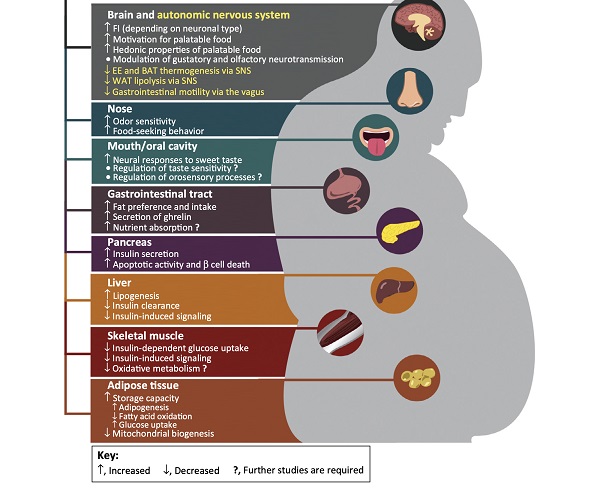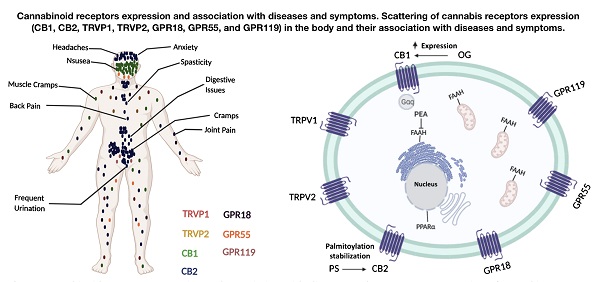In the vast expanse of the cosmos, the human mind has always been intrigued by the mysteries of the universe. One such enigma is the complex relationship between cannabis and eating disorders, specifically bulimia and anorexia. This publication aims to explore the intricate dance between THC, the primary psychoactive compound in cannabis, and these eating disorders, shedding light on the potential benefits and risks for those who use cannabis. Drawing from the latest scientific research and expert opinions, we will embark on a journey through the stars to uncover the truth behind this fascinating topic.
Cannabis has been known for thousands of years as a means of stimulating appetite and encouraging food intake, and has long been used to treat anorexia and related eating disorders. Modern research shows that the connection between the endocannabinoid system and diseases such as anorexia is much deeper than previously thought.
Although cannabis has been investigated as a potential treatment for anorexia and related eating disorders for decades, the results have not always been positive.
An early double-blind, cross-over study published in 1983 compared the effects of THC and diazepam (an active placebo) on the appetites of anorexia nervosa sufferers. The study found that THC administration did not increase caloric intake or overall weight gain, but actually caused “significant psychiatric distress” in several patients.
However, a recent double-blind, cross-over study showed that the synthetic THC analogue dronabinol produced “slight but significant” weight gain in women with anorexia nervosa, compared to placebo, and no significant psychotropic side effects.
Several studies in animal models of anorexia have found that THC administration leads to weight gain and improved appetite in subjects. One study found that in mice with induced anorexia, daily administration of 0.5 mg of THC “reduced survival” in the test group, but increased feeding rate in survivors. Daily administration of a synthetic analogue of anandamide (at a dose of 3 mg/kg), increased feeding rates without affecting overall survival, but not enough to reverse weight loss.
At this point, scientists are still studying how cannabis may affect weight in general, and have suggested that some cannabis users may have a lower BMI (body mass index) despite a higher caloric intake.
The Science of THC and the Endocannabinoid System
To understand the effects of THC on eating disorders, we must first delve into the inner workings of the endocannabinoid system (ECS). This complex cell-signaling system plays a crucial role in regulating various physiological processes, including appetite, mood, and stress response. In this section, we will explore the role of the ECS in the development and maintenance of eating disorders, as well as the potential therapeutic effects of THC on these conditions.
A study published in 2005 showed that people with anorexia nervosa and compulsive overeating had significantly elevated blood levels of the endogenous cannabinoid anandamide, although they remained normal in patients diagnosed with bulimia nervosa. The researchers also found (https://www.mdpi.com/1422-0067/19/3/833) that anandamide levels were inversely related to levels of ghrelin, another molecule that is deeply involved in the regulation of appetite and food intake.
The relationship between ghrelin signaling and the endocannabinoid system has been extensively studied, and it has been observed that THC can effectively act as a stimulant of ghrelin production in cancer patients receiving chemotherapy.
The role of ghrelin is to stimulate the peripheral nervous system and ultimately the brain to induce feelings of hunger when the stomach is empty. If ghrelin is absent for some reason (in chemotherapy patients some drugs inhibit the release of ghrelin), the feeling of hunger is not present even when the stomach is empty, and the patient may develop anorexia (https://pharmrev.aspetjournals.org/content/58/3/389).
Given that anandamide performs many of the same biological functions as THC, it is clear that in patients with compulsive overeating, anandamide flux will stimulate excessive overeating.
THC and Bulimia: A Double-Edged Sword
Bulimia nervosa is characterized by recurrent episodes of binge eating followed by compensatory behaviors, such as self-induced vomiting or excessive exercise. In this section, we will examine the potential benefits and risks of THC use in individuals with bulimia, including its effects on appetite, mood, and impulsivity.
There are several studies specifically examining the effects of cannabis on the appetites of anorexia nervosa sufferers. However, there are many studies on the effects of cannabis and cannabinoids on a form of anorexia, which can occur in people suffering from certain debilitating diseases such as cancer , AIDS or hepatitis.
A Phase II study of the effects of THC on the appetite of cancer patients conducted in 1994 found that out of eighteen subjects, thirteen reported an improvement in appetite after using THC without any serious side effects. On this basis, cannabis was considered an effective and safe appetite stimulant for cancer patients (https://link.springer.com/article/10.1007/s13311-015-0373-7).
However, a recent double-blind, placebo-controlled clinical trial conducted in 2006 found no significant differences in quality of life for either cannabis extract or THC compared to placebo.
While the results of different studies can vary widely, it is clear that the endocannabinoid system plays an important role in appetite and food intake management (https://www.frontiersin.org/articles/10.3389/fpsyt.2013.00130/full). These studies have provided scientists with a deeper understanding of the underlying mechanisms of the endocannabinoid system and the extensive role it has to play in regulating basic biological processes such as appetite, food intake and satiety.
ECS dysfunction and anorexia

Not only is the endocannabinoid system fundamental to the regulation of appetite and food intake, it is now thought that anorexia nervosa and related disorders may actually be caused by an underlying imbalance that could potentially be corrected with targeted cannabinoid therapy.
In a 2011 study, scientists studied the brains of anorexic, bulimic and healthy women using positron emission tomography (PET). The researchers found that anorexia nervosa sufferers had a significant overall increase in CB1-receptor density in the cortex and subcortical brain regions, while bulimia and anorexia patients had significantly higher CB1-receptor density in a particular brain region known as the insular cortex. It was also found that the levels of naturally occurring endocannabinoids were significantly lower in both bulimic and anorexic patients, especially in the insular cortex.
The researchers hypothesized that in anorexic sufferers the overall increase in CB1 receptor density may be a compensatory mechanism for the lack of activity of the endocannabinoid system. They also noted that the increased CB1 receptor density in the islet cortex observed in both bulimic and anorexic patients is probably related to a major dysfunction of the pleasure-reward system, since the islet cortex is known to play a fundamental role in these processes. .
There have also been several studies examining the possibility that mutations in genes related to the endocannabinoid system may lead to a higher risk of developing eating disorders such as anorexia. A study published in 2009 concluded that a pair of polymorphisms may contribute to biological susceptibility to anorexia nervosa and bulimia . These include the CNR1 gene, which encodes expression of the type I cannabinoid receptor, and another that controls the production of the molecule FAAH, which breaks down anandamide.
Conclusion
Studies show that this effect depends on the presence of high levels of CBD or THCV, which have appetite suppressant properties. Studies by the British cannabinoid company GW Pharmaceuticals have shown that two cannabinoids suppress appetite when administered to mice. The effect is due to the fact that the compounds are antagonists and inverse agonists of cannabinoid receptors and block the appetite-stimulating effects of agonists such as anandamide or THC.
Thus, CBD and THCV may be interesting cannabinoids for conditions requiring appetite suppressant drugs. However, it is unlikely that they are responsible for increased cannabis use among anorexics because CBD and THCV levels in recreational cannabis are very low . Instead, CBD and THCV levels are higher in cannabis varieties.
And if a dysfunctional endocannabinoid system does appear to be the underlying cause of anorexia, the use of THC-rich cannabis may bring increased subjective reward to those who lack effective use of anandamide (the endogenous THC analogue).
Much research remains to be done before our understanding of the endocannabinoid system is complete enough for us to fully understand its relationship to the development and treatment of anorexia nervosa. However, it is clear that its role is fundamental, and that a deeper understanding will allow us to develop targeted treatments for anorexia, bulimia, and various related disorders.














